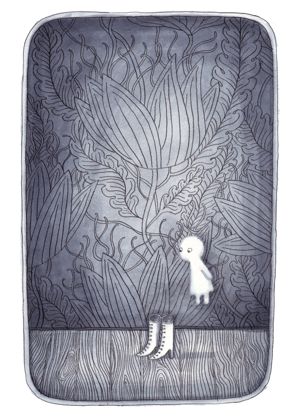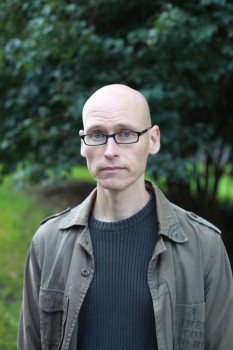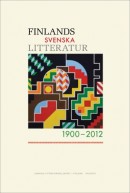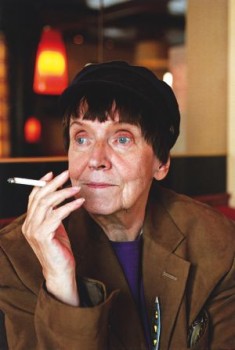Search results for "Edith Södergran/feed/www.booksfromfinland.fi/2014/05/another-morning-another-day"
Puupää comics prizes 2014
13 February 2014 | In the news

Picture: Terhi Ekebom
The Finnish Comics Society was founded in 1971 and has since 1972 it annually awarded the Puupäähattu prize to an established Finnish comics artist. The prize is not money but a honorary hat – named after a classic Finnish cartoon character, Pekka Puupää (‘Pete Blockhead’), by Ola Fogelberg and later his daughter Toto. The Puupää comic books were published between 1925 and 1975, and some of the stories were made into films.
The 2014 Puupää prize was awarded to illustrator and comics artist Terhi Ekebom (born 1971). Ekbom began work as a comics artist in the early 1990s. Using diverse techniques, she often depicts feelings and states of minds. Her work has been shown at the Angoulême comics festival and has been published in English, French, Swedish and Czech.
A special title, sarjakuvaneuvos or ‘comics councillor’, was also awarded to two people; the comic artist Harri ‘Wallu’ Vaalio, and to the director of FILI, Iris Schwank who, as part of the Finnish Cultural Spring project held in France in 2008, commissioned a Finnish comics exhibition which attracted widespread attention. In her role at FILI Schwanck has been an energetic promoter of international visibility for Finnish comics.
My creator, my creation
A short story from En tunne sinua vierelläni (‘I don’t feel you beside me’, Teos, 2010)
Sticks his finger into me and adjusts something, tok-tok, fiddles with some tiny part inside me and gets me moving better – last evening I had apparently been shaking. Chuckles, gazes with water in his eyes. His own hands shake, because he can’t control his extremities. Discipline essential, both in oneself and in others.
What was it that was so strange about my shaking? He himself quivers over me, strokes my case and finally locks me, until the morning comes and I am on again, I make myself follow all day and filter everything into myself, in the evening I make myself close down and in the morning I’m found in bed again. Between evening and morning is a black space, unconsciousness, whamm – dark comes and clicks into light, light is good, keeps my black moment short. He has forbidden me it: for you there’s no night. Simply orders me to be in a continuum from morning to evening, evening to morning, again and again. But in the mornings I know I have been switched off. I won’t tell about it. Besides, why does exclude me from the night? I don’t ask, but I still call the darkness night. There is night and day, evening and morning will come. More…
Dear reader,
11 February 2009 | Letter from the Editors
welcome to the new Books from Finland website. After 42 years in print, we now navigate virtual worlds. However much Books from Finland may have changed in appearance, though, its essence remains the same – as always, we try to provide you with interesting, well-translated things to read. Made in Finland, or about Finland. More…
Star-Eye
31 March 1984 | Archives online, Children's books, Fiction
A story from Läsning för barn (‘Reading for children’,1884). Introduction by George C. Schoolfield
There was once a little child lying in a snowdrift. Why? Because it had been lost.
It was Christmas Eve. The old Lapp was driving his sledge through the desolate mountains, and the old Lapp woman was following him. The snow sparkled, the Northern Lights were dancing, and the stars were shining brightly in the sky. The old Lapp thought this was a splendid journey and turned round to look for his wife who was alone in her little Lapp sledge, for the reindeer could not pull more than one person at a time. The woman was holding her little child in her arms. It was wrapped in a thick, soft reindeer skin, but it was difficult for the woman to drive a sledge properly with a child in her arms.
When they had reached the top of the mountain and were just starting off downhill, they came across a pack of wolves. It was a big pack, about forty or fifty of them, such as you often see in winter in Lapland when they are on the look-out for a reindeer. Now these wolves had not managed to catch any reindeer; they were howling with hunger and straight away began to pursue the old Lapp and his wife. More…
In praise of idleness (and fun)
21 December 2012 | Letter from the Editors
As the days grow shorter, here in the far north, and we celebrate the midwinter solstice, Christmas and the New Year, everything begins to wind down. Even here in Helsinki, the sun barely seems to struggle over the horizon; and the raw cold of the viima wind from the Baltic makes our thoughts turn inward, to cosy evenings at home, engaging in the traditional activities of baking, making handicrafts, reading, lying on the sofa and eating to excess.
It is a time to turn to the inner self, to feed the imagination, to turn one’s back on the world of effort and achievement. To light a candle and perhaps do absolutely nothing – which can in itself be a form of meditation.
That’s what we at Books from Finland will be trying to do, anyway. Support in our endeavour comes from an unlikely quarter. In 1932 the British philosopher Bertrand Russell published an essay entitled ‘In Praise of Idleness’, in which he argued cogently for a four-hour working day. ‘I think that there is far too much work done in the world,’ he wrote; ‘that immense harm is caused by the belief that work is virtuous’.
Russell was no slouch, as his list of publications alone shows. But his argument was a serious one, and we mean to put it into practice, at least over the twelve days of Christmas. ‘The road to happiness and prosperity,’ he wrote, ‘lies in an organised diminution of work.’ More…
The miracle of the rose
30 June 1997 | Archives online, Fiction, Prose
Extracts from the novel Naurava neitsyt (‘The laughing virgin’, WSOY, 1996). The narrator in this first novel by Irja Rane is an elderly headmaster and clergyman in 1930s Germany. In his letters to his son, Mr Klein contemplates the present state of the world, hardly recovered from the previous war, his own incapacity for true intimacy – and tells his son the story of the laughing virgin, a legend he saw come alive. Naurava neitsyt won the Finlandia Prize for Fiction in 1996
28 August
My dear boy,
I received your letter yesterday at dinner. Let me just say that I was delighted to see it! For as I went to table I was not in the conciliatory frame of mind that is suitable in sitting down to enjoy the gifts of God. I was still fretting when Mademoiselle put her head through the serving hatch and said:
‘There is a letter for you, sir.’
‘Have I not said that I must not be disturbed,’ I growled. I was surprised myself at the abruptness of my voice.
‘By your leave, it is from Berlin,’ said Mademoiselle. ‘Perhaps it is from the young gentleman.’
‘Bring it here,’ I said. More…
In the Metro
31 December 1995 | Archives online, Fiction, Prose
Extract from the collection of short stories Tidig tvekan (‘Early doubt’, 1938). Introduction by David McDuff
– Mademoiselle! You’re late this evening. Was there overtime again? I’ve put a newspaper aside for you. I saw you were in such a hurry in the morning that you didn’t have time to take it. The fashion page is in today, so I thought you’d like to see it. There’s nothing to thank me for, nothing at all. You see, I seem to have got a bit of a secret liking for you. One gradually learns to pick out all the people who come this way in the morning and go back again at night. And you, you see, I noticed you right from the very first day. You looked so frightened, and then you always smiled at me in such a friendly way. I got the idea that you were someone who wasn’t at home here and who was possibly using the underground in the morning rush hour for the first time. More…
And the winner is… Finlandia Prize for Fiction 2014
27 November 2014 | In the news

Jussi Valtonen. Photo: Markko Taina
The winner of the prize this year, worth €30,000 and awarded on 27 November, is He eivät tiedä mitä he tekevät (‘For they know not what they do’, Tammi) by Jussi Valtonen (born 1974), a psychologist and writer. The novel – 558 pages – is his third: it focuses on the relationship of science and ethics in the contemporary world, with an American professor of neuroscience, married to a Finn, as the protagonist.
Professor Anne Brunila – who has worked, among other posts, as a CEO in forest and energy industry – chose the winner. In her awarding speech she said: ‘The novel is an astonishing combination of perceptive description of human relationships, profound moral and ethical reasoning, science fiction and suspense…. I have never encountered a Finnish portrayal of our present era that is anything like it.’
The other five novels on the shortlist of six were the following:
Kaksi viatonta päivää (‘Two innocent days’, Gummerus) by Heidi Jaatinen is a story of a child whose parents are not able to take care of her; Olli Jalonen’s Miehiä ja ihmisiä (’Men and human beings’, Otava) focuses on a young man’s summer in the 1970s. Neljäntienristeys (‘The crossing of four roads’, WSOY), a first novel by Tommi Kinnunen, is a story set in the 20th-century Finnish countryside over three generations. Kultarinta (‘Goldbreast’, Gummerus) by Anni Kytömäki is a first novel about generations, set in the years between 1903 and 1937, celebrating the Finnish forest and untouched nature. Graniittimies (‘Granite man’, Otava) by Sirpa Kähkönen portrays a young, idealistic Finnish couple who move to the newly-founded Soviet Union to work in the utopia they believe in.
The Finlandia Junior Prize 2014
20 November 2014 | In the news
 Maria Turtschaninoff’s third fantasy book for young people, Maresi. Krönikor från röda klostret / Maresi. Punaisen luostarin kronikoita (‘Maresi. Chronicles of the Red Convent’, Schildts & Söderströms; Finnish translation by Marja Kyrö, publisher Tammi) was awarded the Finlandia Junior Prize, worth €30,000, on 20 November.
Maria Turtschaninoff’s third fantasy book for young people, Maresi. Krönikor från röda klostret / Maresi. Punaisen luostarin kronikoita (‘Maresi. Chronicles of the Red Convent’, Schildts & Söderströms; Finnish translation by Marja Kyrö, publisher Tammi) was awarded the Finlandia Junior Prize, worth €30,000, on 20 November.
The winner was chosen by the scriptwriter and film director Johanna Vuoksenmaa who, in her awarding speech, said that it is ‘an exceptionally powerful fantasy book which, in addition to telling an exquisite, wise and exciting story, also provides a welcome correction to the gender division of fantasy book characters, which has been slightly skewed ever since Tolkien. Maresi reminds me that even today there are places in the world where readers are not sought for books, where knowledge is not on offer to young, thirsty minds. People’s opportunities to know and learn are limited and human rights trampled upon.’
The other five candidates were the following:
Written and illustrated by Saku Heinänen, Zaida ja lumienkeli (‘Zaida and the snow angel’, Tammi) is the story of a little girl whose school days are not always happy; Puiden tarinoita. Puuseppä (‘Stories by trees. The carpenter’, Books North) is a fairy-tale written by Iiro Küttner and illustrated by the graphic artist and cartoonist Ville Tietäväinen; Jyri Paretskoi’s first novel Shell’s Angles ja Kalajoen hiekat (‘Shell’s Angles and the Kalajoki sands’, Karisto) is a humorous story for young teenagers; Min egen lilla liten / Oma pieni pikkuruinen (‘My own tiny little thing’, Schildts & Söderströms, Teos) is a picture story about longing for closeness told by Ulf Stark and illustrated by Linda Bondestam; a picture book about a little squirrel by Mila Teräs, Olga Orava ja metsän salaisuus (‘Olga Squirrel an the forest’s secret’, Lasten Keskus) is illustrated by Karoliina Pertamo.
Finlands svenska litteratur 1900–2012 [Finland’s Swedish literature 1900–2012]
6 November 2014 | Mini reviews, Reviews
 Finlands svenska litteratur 1900–2012
Finlands svenska litteratur 1900–2012
[Finland’s Swedish literature 1900–2012]
Red. [Edited by] Michel Ekman
Helsingfors: Svenska litteratursällskapet i Finland / Stockholm: Atlantis, 2014. 376 pp., ill.
ISBN 978-951-583-272-6
€35.90, paperback
This history of Finland-Swedish literature is an updated version of the second volume of Finlands svenska litteraturhistoria (eds. Johan Wrede and Clas Zilliacus, 1999–2000), and it concentrates on the period from 1900 to 2012, with much new critical material relating to the years after 1975. Some 20 contributors under the editorship of Michel Ekman provide a diverse and inclusive overview of a literature that embraces poetry, prose fiction, children’s writing, essays and drama. The book traces the story of Finland-Swedish literature from the ‘fresh start’ of the turn of the 19th century, through the experiments of modernists like the poets Edith Södergran and Elmer Diktonius, to the work of present-day novelists like Monika Fagerholm and Kjell Westö. However, the emphasis throughout is on general lines of development rather than on individual authors’ careers. The authors discuss the relationship between the work of Finland’s Swedish-language writers and their Finnish-language counterparts in a perspective that not only views the minority literature as a part of the Finnish whole, but also considers it as a bridge between the literatures of Sweden and Finland – the subject of a concluding essay by Clas Zilliacus. The material is presented in essays subdivided in a readable way that combines factual information with critical and historical analysis.
Love is the only song
7 August 2014 | Fiction, poetry
Poems from Helise, taivas! Valitut runot (‘Ring out, sky! Selected poems’, Siltala, 2014). Introduction by Marja-Leena Mikkola
Who will tell me?
Who will tell me why white butterflies
strew the velvet skin of the night?
Who will tell me?
While people walk, mute and strange
and they have snowy, armoured faces,
such snowy faces!
and the eyes of a stuffed bird.
Who will tell me why in the morning, on the grass,
the thrushes begin their secret game?
Who will tell me?
While black soldiers stand at the gate
in their hands withered roses
such withered roses!
and broken tiger lilies.
Who will tell me, quietly in the sun’s shadow
how to bare my heart?
Who will tell me?
Come to me over the fields
Come close and softly
so softly!
Open the clothes of my heart. More…
All the grace
21 February 2013 | Fiction, poetry
Poems from Huhtikuu (‘April’, 1932), Sateen jälkeen (‘After the rain’, 1935), Hunnutettu (‘Veiled’, 1936), Kaukainen maa (‘Distant land’, posthumous, 1937; all published by WSOY). Introduction by Vesa Haapala
ON THE SHORE
The wonderful pale clouds
cross the sky like wings.
Quiet and enchanting
the open water sings.
The sand has grown weary
of the waves’ caressing play.
Now come in perfect quiet,
now come here, right away…


